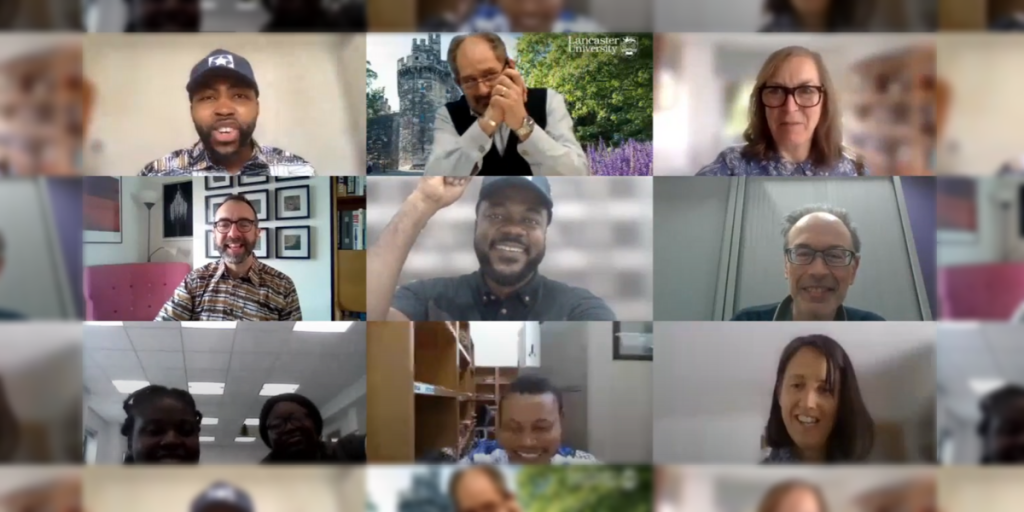Thank you for PARTICIPATING!

Last week we saw the conclusion of the PARTICIPATE with RECIRCULATE series, with our International Impact Webinar: Enterprise. The webinar was held 24th March 2022 and explored the opportunities for entrepreneurs and professionals from RECIRCULATE research.
The webinar also served as a celebration of the RECIRCULATE Project – with partners, former residents and members of the wider team engaging and dancing in between the panels to music provided by Dr (or perhaps DJ?) Akan Odon. Unfortunately, there were copyright issues when uploading the webinar to Youtube and as a result some sections with music needed to be cut. We will provide an uncut alternative link at the end of the article. Moderated by Dr Akan Odon and the RECIRCULATE team, the webinar featured speakers from University of Benin and Lancaster University.
Prof. Kirk Semple (Director RECIRCULATE & ACTUATE, Director of International Engagement within LEC, Assistant Dean International for the Faculty of Science and Technology) introduced the final webinar and detailed RECIRCULATE and ACTUATE’s relationship with entrepreneurs and professionals and highlighted the importance of multi-disciplinary and multi-sectoral collaboration, which will be key to continuing the work of the projects and for enterprise opportunities in the future. Kirk also discussed the importance of impact with longevity, highlighting engagement and knowledge exchange with different stakeholder communities, entrepreneurship and innovation with focus on waste as a resource and business opportunities, and cultural and generational change with young people and change makers. Finally, Kirk gave thanks to the project partners for their involvement and noting there was lots to celebrate.
Dr Joanne Larty (Entrepreneurship and Innovation work package leader , Associate Director Centre for Global Eco-Innovation), started off the first panel session webinar. Joanne discussed her teams SETS programme (Stimulating Entrepreneurial think amongst Scientists), showcasing multiple aspects, one to create wider impact from research by using entrepreneurial thinking to identify opportunities to create impact from research and another to identify business opportunities for students and academics through entrepreneurial thinking. Joanne also stressed the importance of building stronger relationships between academia, industry, policy and communities, finishing up with some of the key findings of WP1’s work.
Prof. Roger Pickup (co-lead of the Water for Sanitation & Health team presented the next panel session, first addressing ‘the challenge’ from the main research question – ‘How does drinking water consumed in Africa’s poor urban communities get contaminated with faecal waste and can we find a safe circular solution to this problem, demonstrate in Accra, Ghana?’ Roger noted that it was essential for the team to engage and work with the community and showcased some of the activities the team took part in when addressing the issue, including the launch and delivery of handwashing facilities to the community, community clean-up, and mapping the community’s infrastructure to repair/upgrade drains, taps and water connections. Roger finishing by noting the positive outcomes of the work and impacts to be expected.
Dr Andrew Amenaghawon (ACTUATE co-leader, senior lecturer & head of department, University of Benin, Nigeria) highlighted the objectives of the Water for Energy Production team, looking into the anaerobic digestion process and aiming to optimise the process, effectively sanitising waste to combat pathogen challenges and measuring the value of sanitised digestate in agriculture. Andrew showcased some of the impacts of this work, including capacity building with researchers, educators and community stakeholders – with local farmers keen to use digestate and motivated to test this on other crops. Andrew finished the panel by looking to the legacy of this work and future opportunities, showcasing that research findings have already been translated into real life biogas plants in Nigeria and Ghana through ACTUATE, sharing that undergraduate research projects are now focused on environmental management and sustainable energy and also noting a paradigm shift, with waste now being viewed as a valuable resource.
Prof. Ian Dodd’s (WP3 Lead and RECIRCULATE Deputy Director) panel started by covering the basic premise of the Water for Food Production work package, which is to identify appropriate water efficient irrigation to cultivate crops, specifically rice, maize and tomato’s which have importance in Africa and globally. The work package has been looking at ways to develop and optimise irrigation techniques for smallholder communities. Ian went on to highlight the potentially positive outcomes and impact, with the research showing a considerable water save with the tested irrigation techniques. The panel closed reflecting on whether farmers will be willing to adopt irrigation scheduling technologies along with using digestate as an alternative nutrient source.
Kirk finalised the session by highlighting accomplishments of RECIRCULATE and ACTUATE, praising the development of partnerships, collaboration, and friendships. Kirk noted the personal investment across the group and stressed the importance of maintaining the relationships and collaboration following the end of the projects. Kirk also revealed he’s been working with members across the network with the ambition to secure more funding to continue collaborative engagement, along with plans for a workshop this year to bring the partnership together and identify the key areas of interest collaboratively and also discuss ideas for future proposals. Kirk finished by thanking everyone for their continued support, engagement, energy and vision and stated he’s very much looking forward to continuing to work with everybody going forward.
At the close of PARTICIPATE we’ve held a total of 17 webinars, 13 spotlight interviews (within PARTICIPATE, there is now 38 total), 12 social media live sessions and a blog writing competition. At the end of last year we summarised the events of PARTICIPATE in 2021; given that we’ve been wrapping up the project for the last month and coordinating the RECIRCULATE Final Meeting and also assisting with the Connecting the Unconnected International Symposium, we have less to report for the final months with us only having held the first part of our International Impact Webinars with focus on students and academics. If you wish to check previous content from the PARTICIPATE series, you can find previous activities and links to recordings on our website.
Thank you to all who have ‘participated’ on this journey, we couldn’t have done this without your contributions, support, engagement and feedback!
View the uncut webinar here.
